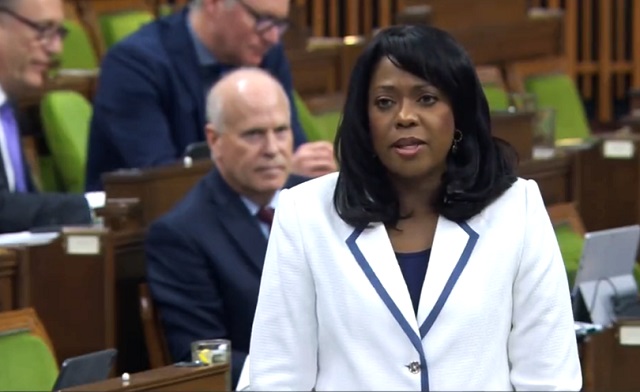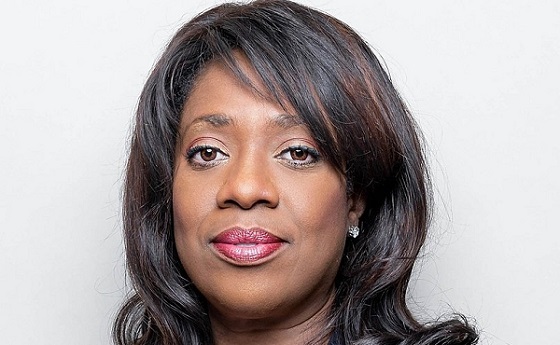Great Reset
Leslyn Lewis warns WHO pandemic treaty amendments violate Canadian sovereignty

From LifeSiteNews
The WHO amendments were adopted despite thousands of Canadians appealing for their rejection.
Conservative MP Leslyn Lewis has blasted that the World Health Organization’s (WHO) new International Health Regulations (IHR), warning they will compromise Canada’s sovereignty.
On December 19, Dr. Leslyn Lewis, Conservative Member of Parliament (MP) for Haldimand-Norfolk, Ontario, condemned Health Minister Mark Holland for failing to protect Canada’s sovereignty by consenting to pandemic amendments put forward by the WHO, which give the international organization increased power over Canadians.
“Canada consented to the amendments to the WHO’s International Health Regulations (IHR), which limits Canada’s time to respond to further amendments, despite thousands of Canadians signing a petition expressing their concerns,” Lewis wrote on X, formerly known as Twitter.
Canada consented to the amendments to the WHO’s International Health Regulations (IHR), which limits Canada’s time to respond to further amendments, despite thousands of Canadians signing a petition expressing their concerns.
See my letter below outlining why the response to… pic.twitter.com/1AZ63ebHX3
— Dr. Leslyn Lewis (@LeslynLewis) December 19, 2023
In October, Lewis endorsed a petition demanding the Liberal government under the leadership of Prime Minister Justin Trudeau “urgently” withdraw from the United Nations and its subgroup, the World Health Organization (WHO), due to the organizations’ undermining of national “sovereignty” and the “personal autonomy” of citizens.
The petition was signed by nearly 19,000 Canadians despite only being open for 30 days. It warned that the “secretly negotiated” amendments could “impose unacceptable, intrusive universal surveillance, violating the rights and freedoms guaranteed in the Canadian Bill of Rights and the Charter of Rights and Freedoms.”
However, despite Canadians’ concerns, the Trudeau government adopted the amendments proposed by the WHO. The new amendments reduce the time for “rejecting any future amendments to the IHR (2005) from 18 months to 10 months” and “implementing future changes into Canadian domestic law from 24 months to 12 months.”
According to Lewis, the amendments alter the original treaty by failing to provide sufficient time for Canadians to consider changes to the agreement before they are scheduled to take effect.
Lewis further explained that the amendments were first presented at the 75th World Health Assembly in 2022 in violation of the IHR law which states, “The text of any proposed amendment shall be communicated to all States Parties by the Director-General at least four (4) months before the Health Assembly at which it is proposed for consideration. ”
“Such amendments were illegitimately submitted and must therefore be regarded as null and void,” Lewis argued. “The question is, why were they not regarded as null and void by Canada?”
Lewis pointed out that the 10-month period “would not allow sufficient time for Canada to study and closely examine the 300+ amendments currently being considered by the IHR.”
“This period will be far too short to determine the scale of impacts of these proposed amendments on our domestic laws and the Canadian people,” she added.
“This period will also be far too short to have these amendments go through the parliamentary process and to conduct the necessary public consultations on changes that constitute binding rules on Canada’s response to health emergencies,” Lewis warned.
U.N.’s Agenda 2030 and the WEF’s ‘Great Reset’
The Trudeau government’s rejection of Canadians’ concerns and acceptance of the amendments should not come as a surprise considering Trudeau’s environmental goals which are in lockstep with the United Nations’ “2030 Agenda for Sustainable Development.”
Agenda 2030 was adopted by the U.N. General Assembly in 2015. Through its 17 Sustainable Development Goals (SDGs), it seeks to “transform our world for the better,” by “taking urgent action on climate change,” as well as “support[ing] the research and development of vaccines and medicines.” Some of the 17 goals also seek to expand “reproductive” services, including contraception and abortion, across the world in the name of women’s rights.
According to the U.N., “all” nations working on the program “will implement this plan.”
Part of the plan includes phasing out coal-fired power plants, reducing fertilizer usage, and curbing natural gas use over the coming decades. Canada is one of the world’s largest oil and gas producers; however, Trudeau has made it one of his goals to decimate the industry.
Critics have sounded the alarm over the Trudeau government’s involvement in the WEF and other globalist groups, pointing to the socialist, totalitarian nature of the “Great Reset” agenda and its potential to usher in a Communist China-style social credit system.
In a blow to the globalist U.N. agenda, however, Canada’s oil and gas sector recently scored a huge win after the Supreme Court of Canada declared Trudeau’s government’s Impact Assessment Act, dubbed the “no-more pipelines” bill, is mostly “unconstitutional.”
As for Lewis, she is pro-life and has consistently called out the Trudeau government for pushing a globalist, anti-life agenda on Canadians.
Early last year, Lewis noted that the WEF is “not our government” and that Canadians did not “sign up” to be attached to one of its charters. Lewis herself helped expose Canadians to the fact that Trudeau’s Liberal government signed onto the WEF charter in 2020.
Great Reset
EXCLUSIVE: The Nova Scotia RCMP Veterans’ Association IS TARGETING VETERANS with Euthanasia

I just received an email from a retired member of the RCMP…
“I served for 32 years on the West Coast and retired in 2019. As a Christian and a retired member of the RCMP I wanted to share this with you. I’m trying to wrap my head around this shocking email. I’m shocked it’s come to this.” – L.K
SATURDAY, NOV. 22, 2025
1:30-3:00 PM CHURCH HALL, OLD SACKVILLE ROAD, MIDDLE SACVILLE, NS, B4E 1R3.
On November 20th, an email quietly dropped into the inboxes of Nova Scotia RCMP veterans. Standard, polite and in true Canadian fashion formal and sanitized. This was no mistake, this wasn’t information. This was something different.
This was grooming.
Yes I said it, coercion.
The “opportunity” was a “Medical Assistance in Dying (MAID) Program in Nova Scotia”
This is a state-aligned institutions normalizing death as a service to the very people they already failed to support in life .This was a information session, to “educate” veterans who’s rates of PTSD and suicidality were already sky hight. How they can apply or use MAID.
The invited speaker?
Dr. Gordon Gubitz
Location? None other than a place of worship, a church hall. The target audience?
VETERANS.
This is what I’ve been talking about, welcome to the soft-coercive stage of Canada’s MAID regime.
Let’s meet Dr. Gordon Gubitz. The same Dr. Gubitz whois a MAID assessor and provider (killer) is the Clinical Lead for MAID in Nova Scotia, which means MAID is his not only his passion but spends his work focused on ending lives. This “Dr” sits on the board of CAMAP, the pro death organization that creates all the pathways for Canadians to be killed while manipulating the court systems in their favour. More death to them is the goal. This “Dr” helped write the national MAID curriculum and trains doctors on how to present MAID as a “care option.” This guy is literally a death pusher and peddler of the dark.
Think of him a the drug dealer for death.
They didn’t invite a trauma specialist.
They didn’t invite a palliative expert.
They didn’t invite a police mental-health advocate.
They didn’t invite a mental health expert
They didn’t invite a Dr who looks at psychedelic assisted therapy
They didn’t invite hope. They only invited death.
Kelsi Sheren is a reader-supported publication.
To receive new posts and support my work, consider becoming a free or paid subscriber.
Nova Scotia RCMP veterans invited a man whose job is to facilitate, provide and promote nothing but death, and whose organization teaches clinicians how to introduce MAID (assisted SUICIDE) to patients who didn’t ask for it, bring it up or want it in their life.
Let me explain something, If you’re a veteran dealing with PTSD, chronic pain, TBI, disability, or bureaucracy-induced despair, this isn’t “education.”
This is targeted psychological pressure.
Coercion, CAMAP and Dying with Dignity’s claim to fame.
No one will say the words out loud. No one will write “we think some of you should consider dying.”
They don’t need to, when just dangling the carrot is good enough to get the job done.
Coercion today is subtle, normalized in the community. It’s dressed up like Christmas cookies in a church call, framed as loving “support” being held by one of the most prolific death pushers in the game.
Simply funnelling veterans into the system one “information session” at a time. Like cattle through the gates of hell, with CAMAP waiting in the shadows. This time not with a bold gun. They would see that as “too humane”, but with a pen, check list, a needle and a paralytic.
Canada already proved it’s willing to dangle MAID (assisted suicide, murder, early death) in front of struggling veterans. I helped break these stories and bring our veterans stories to the masses. I’m interviewing more by the day, who’ve been offered death over life illegally.
VAC employees got caught offering MAID to veterans who never asked for it, including one trying to get a wheelchair ramp, my friend Christine.
So do me a favour spare us the “this is innocent” act.
Veterans have been coerced before, and it’s happening again right in front of your faces. Now the RCMP Veterans’ Association is rolling out the red carpet for the prevailers of death. The dark ones who feed on the souls of those who couldn’t bare to take another breath.
This is not an “opportunity.”
This is a sales pitch.
And the product is your death.
People keep asking me why veterans are being targeting? Because they’re the perfect targets, don’t you see?
Kelsi Sheren is a reader-supported publication.
To receive new posts and support my work, consider becoming a free or paid subscriber.
Veterans, on the daily are dealing with chronic pain, combat trauma, moral injury, sanctuary trauma, disability, suicidality, lack of services, financial strain, bureaucratic obstruction and the government doesn’t just know know it, it caused it and it supports it and so do the MAID, pro death cult architects.
The MAID lobby knows veterans are “high-yield” candidates, and not because they want to die, but because the system has already worn them down, like water slowly dripping over the rocks. The Liberal government just cut OVER 4 BILLION in care for veterans. Veterans aren’t being shown the full picture, they aren’t given any hope. They’re being shown the early exit. What we call in some circles, being shown the path to “self-selection.”
This RCMP veterans email is a soft-touch version of coercion if I’ve ever seen one.
“We’re not telling you to choose MAID… we’re just putting the idea on the table, in a friendly community space, with a trusted expert who helps design the national MAID system.” Who’s job is to provide you with all the pathways to wanting to kill yourself.
That’s how you manipulate a vulnerable population without leaving fingerprints.
Dr. Gubitz isn’t neutral. He is the system.
Gubitz isn’t walking into that church as an independent medical educator.
He is walking in as the clinical gatekeeper for MAID in Nova Scotia, IE. HELL. He’s nothing more than one of the ideological engines behind national MAID training. A CAMAP insider, the organization pushing to expand and normalize MAID (assisted SUICIDE) at every level of “healthcare,” if you can even call it that anymore. CAMAP literally publishes guidance on how clinicians should bring up MAID as a care option. Not reactively. Proactively.
When you pair a vulnerable group with a man trained to present MAID as “equitable access,” your “information session” becomes a recruitment funnel.
HOW IS EVERYONE OK WITH THIS?
You are directly influencing and priming veterans for death under the banner of “support.” It’s an illusion, it’s predatory behaviour! It’s not informed consent in any way. It’s manipulation.
And holding it in a church? That’s strategic psychological laundering.
Churches are trusted spaces. They lower defences, help you to open your mind. Churches to most signal moral legitimacy so hosting a MAID talk in a church hall tells veterans “your community approves. Your faith approves this is acceptable, this is dignified, you don’t have to fight or feel guilty, ”
It cloaks a controversial, ethically fraught practice in community warmth. It’s taking advantage of the safety and sanctity of church.
That’s not an accident.
It’s a tactic.
This wreaks of propaganda wrapped in hospitality.
This is the playbook of a system that wants to solve suffering by eliminating the sufferer.
Canada won’t fix the care gaps. It won’t fix the mental-health crisis. It won’t fix VAC’s failures and it sure as hell won’t fix disability supports.
But it will happily fund a national MAID curriculum, expand eligibility, remove guardrails, and now apparently send MAID providers on a tour of vulnerable communities.
Veterans have always been canaries in Canada’s moral coal mine.
If the state can normalize MAID to the people who wore its uniform, it can normalize it to anyone. And that’s the point.
This story isn’t about one email. It’s about a culture shift engineered from the top down.
This is how you create acceptance – – >
First, make MAID look compassionate.
Then, bring it into community spaces.
Then, present to vulnerable groups.
Then, call it “support.”
Then, remove the stigma.
Then, remove the safeguards.
Then, expand eligibility.
Then, tell the public: “People are choosing MAID because it’s dignified.”
They leave out the part where the system helped manufacture despair.
Veterans deserve better than an invitation to die.
They deserve care, treatment, advocacy, and someone who doesn’t treat their suffering as a problem to be erased.
Not a church basement with coffee and a state-aligned MAID architect explaining their “options.”
This email isn’t benign.
It is a warning, one Canada should have heeded years ago.
If the country is comfortable offering death to the people who served it, it’s comfortable offering it to anyone.
And that’s exactly what’s happening.
Please feel free to call or email them and let them know how this makes you feel.
KELSI SHEREN
– – – – – – – – – – – – –
One Time Donation! – Paypal – https://paypal.me/
Buy me a coffee! – https://buymeacoffee.com/
Youtube – https://www.youtube.com/@
Substack: https://substack.com/@
TikTok – https://x.com/KelsiBurns
Listen on Spotify:
|
|
The Kelsi Sheren Perspective
Kelsi Sheren Podcast |
SUPPORT OUR SPONSORS
– – – – – – – – – – – –
Ketone IQ- 30% off with code KELSI – https://ketone.com/KELSI
Good Livin – 20% off with code KELSI – https://www.itsgoodlivin.com/?
Brass & Unity – 20% off with code UNITY – http://brassandunity.com
Kelsi Sheren is a reader-supported publication.
To receive new posts and support my work, consider becoming a free or paid subscriber.
Digital ID
Leslyn Lewis urges fellow MPs to oppose Liberal push for mandatory digital IDs

From LifeSiteNews
The Conservative Party MP told fellow members of Canada’s House of Commons that digital IDs lead to increased surveillance by the state that must be kept in check.
One of Canada’s most staunchly pro-life MPs warned Canadians to be “on guard” against a push by the ruling Liberal Party to bring forth Digital IDs, saying that they should be voluntary.
Earlier this week, Conservative Party Member of Parliament Leslyn Lewis told fellow MPs in the House of Commons that increased surveillance by the state must be kept in check.
“Every promise of transparency can become a tool of surveillance if not guided by the principles of freedom that we cherish,” she said.
“If everything of value becomes data, every aspect of our lives can become data to be recorded and monetized. That is why we must be on guard.”
Lewis made the comments in light of news, as reported by LifeSiteNews, that the federal government under Prime Minister Mark Carney will move ahead with digital identification for anyone seeking federal benefits, including seniors on Old Age Security.
Lewis told MPs that Canadians “deserve to know where data are stored, who profits from its use and whether freely opting out of systems including digital ID will remain a right in the digital era, especially when it comes to accessing essential taxpayer-funded services.”
“Without these answers, a trusted artificial intelligence ecosystem becomes a polite euphemism for centralized control,” she warned.
Lewis also noted that citizens should never be “reduced to mere consumers at the end of a bar code,” adding that “Human beings are not data points to be managed.”
“We are souls with a purpose. The future we build must reflect that truth,” she said.
Despite Lewis’s remarks, the government, in a recent note in Carney’s 2025 budget that passed earlier this week, said that changes will be made to the Department of Employment and Social Development Act. The goal is to “enable the delivery of more integrated and efficient services across government.”
As reported by LifeSiteNews, the Canadian government hired outside consultants tasked with looking into whether or not officials should proceed with creating a digital ID system for all citizens and residents.
As per a May 20 Digital Credentials Issue memo, as noted by Blacklock’s Reporter, the “adoption” of such a digital ID system may be difficult.
Canada’s Privy Council research from 2023 noted that there is strong public resistance to the use of digital IDs to access government services.
Nonetheless, Conservative leader Pierre Poilievre sounded the alarm by promising to introduce a bill that would “expressly prohibit” digital IDs in Canada.
Digital IDs and similar systems have long been pushed by globalist groups like the World Economic Forum, an organization with which Carney has extensive ties, under the guise of ease of access and security.
-

 Energy2 days ago
Energy2 days agoCarney bets on LNG, Alberta doubles down on oil
-

 Alberta2 days ago
Alberta2 days agoAlberta on right path to better health care
-

 Indigenous2 days ago
Indigenous2 days agoTop constitutional lawyer slams Indigenous land ruling as threat to Canadian property rights
-

 Alberta2 days ago
Alberta2 days agoCarney government’s anti-oil sentiment no longer in doubt
-

 Alberta2 days ago
Alberta2 days agoAlberta Emergency Alert test – Wednesday at 1:55 PM
-

 Alberta1 day ago
Alberta1 day ago‘Weird and wonderful’ wells are boosting oil production in Alberta and Saskatchewan
-

 Health2 days ago
Health2 days agoSPARC Kindness Tree: A Growing Tradition in Capstone
-

 Business1 day ago
Business1 day agoCanada is failing dismally at our climate goals. We’re also ruining our economy.










